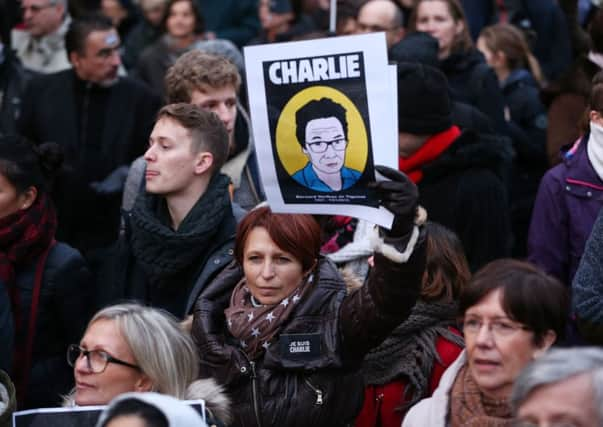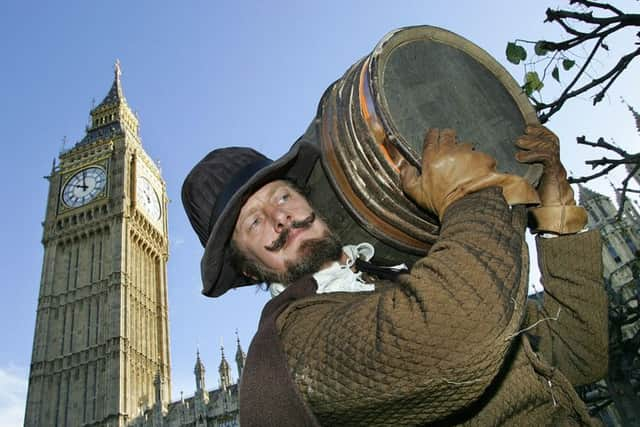Allan Massie: Tolerance must be our watchword


“This has nothing to do with Roman Catholicism,” ministers were quick to assert after the discovery of the plot to blow up the Houses of Parliament.
CONNECT WITH THE SCOTSMAN
• Subscribe to our daily newsletter (requires registration) and get the latest news, sport and business headlines delivered to your inbox every morning


Advertisement
Hide AdAdvertisement
Hide Ad“The vast majority of Catholics are law-abiding citizens and loyal subjects of King James. The terrorists are a few individuals radicalised by Jesuit preachers.” Well, of course, ministers said no such thing in 1605, but had they done so, they would probably have been correct. Likewise, when Covenanting extremists murdered the Archbishop of St Andrews in the sight of his daughter on Magus Muir, it is probable that most Scots Presbyterians were united in disapproval of this act of terrorism. Nevertheless in both cases there would have been a number of co-religionists who in their heart of hearts couldn’t bring themselves to condemn the violence.
I offer these comparisons with acts of terrorism today not to suggest that Muslims here or in France approve of the Charlie Hebdo and Jewish supermarket murders, for I am sure most are horrified by them, but, first, because it’s good to remember that we have our own history of religiously-inspired terrorism, and, second, because we should recognise that it is natural to have some sympathy, however reluctant, for people acting, however misguidedly, in the name of your creed or cause.
Our experience of the Troubles in Northern Ireland offers the same message; it was not easy for some Catholics wholeheartedly to reject the IRA or some Protestants entirely to disown the Loyalist gunmen.
One cannot reasonably say that the Paris shootings have nothing to do with Islam, for the murderers made it clear that they were acting in the name of Islam. Much remains unknown, but it seems that they cannot be dismissed as deranged lone wolves. The Kouachi brothers claimed association with al-Qaeda in Yemen, Ahmedy Coulibaly with Islamic State. Like the Gunpowder plotters and the extreme Covenanters, they believed they were soldiers in a religious war.
That war has, happily, rarely surfaced in Europe. It is raging in the Middle East, in Pakistan and parts of Africa, notably Nigeria. The atrocities last week in Paris are, like the London tube bombings or the horrifying murder of Lee Rigby, minor acts of terrorism in comparison with what IS has been doing in Iraq and Syria, the Pakistani Taleban in Peshawar, or Boko Haram in Nigeria. The victims of Islamist terror have been Christians, Jews, Yazidis, Alawites and, overwhelmingly, fellow-Muslims. Inasmuch as this is a war of religion, it is also a war within Islam, just as the religious wars of the 16th and 17th centuries were wars within Christendom.
Naturally enough our first concern is domestic, with what this means for us here in Britain and in Europe. The most encouraging feature of the last week was undoubtedly the coming together of the French people, of all religions and none, in support of the republican and European values of liberty, equality and fraternity.
Ostensibly Britain and France have taken a different approach to the reality of a large Muslim immigrant (or second and third generation immigrant) population. We have spoken of multi-culturalism, respect for difference; the French of integration, with immigrants required to conform to the principles of the Republic. In practice the difference has been less. Muslims here have become, or been expected to become, British, Muslims in France French. Most have done so. In both countries Muslims serve in the army and the police, and work as doctors, lawyers, teachers, businessmen, civil servants and politicians. Many may with reason still feel themselves marginalised and even excluded; nevertheless integration has proceeded faster, and gone further, than might have been thought probable a couple of generations ago.
In both countries politicians have rightly called for unity, and emphasised that the Muslims now belong here. Throughout Europe politicians recognise the danger of an anti-Muslim backlash – which, we may be certain, would make things only worse. Several mosques have been attacked over the last week in France. In Germany the Pegida movement has suddenly sprung up protesting against what it calls the “Islamification of Europe”. It has been condemned by the German government, but it is unlikely to wither quickly – if only because Germany accepts more refugees from Muslim countries than any other state in the European Union.
Advertisement
Hide AdAdvertisement
Hide AdYet the more strongly anti-Muslim feeling is expressed, the more certain it is that more young men and women will be radicalised. And if European Muslims feel victimised, the more some will sympathise, silently and even unwillingly, with the violence of activists. We should remember that it was tolerance of minorities and respect for differences that defused and brought an end to religious conflict in Christendom.
We cannot solve the problems, or end the divisions, in the Muslim world though in Africa at least we could, and should, act, to protect endangered Christians.
But there are things we must do to make it less likely that young Muslims here are radicalised. In this context the story of the Kouachi brothers is relevant. When their widowed mother was unable to care for them, they were sent, aged 14 and 12, to a state boarding-school, established by the Claude Pompidou Foundation. They did well, caused no trouble, and were popular. But when they left they returned to Paris with no family structure to support them. Speaking of the younger boy, Cherif, one of his teachers said: “He joined up with little groups of hooligans. They ran rings round him because he was relatively fragile and he allowed himself to be led by the nose.”
One of his classmates, Jean-Henri Rousseau, was close to tears when he spoke about Cherif on French TV: “Nobody at the foundation had problems with these young people. They were popular. Cherif was sweet, he was an adorable child.”
But the adorable child grew up to be a murderer. There must be a way of nurturing what is good in such young men and deterring them from embracing a perverted form of their religion which leads them to commit such atrocious acts. But Lord knows how we find it.
SCOTSMAN TABLET AND IPHONE APPS